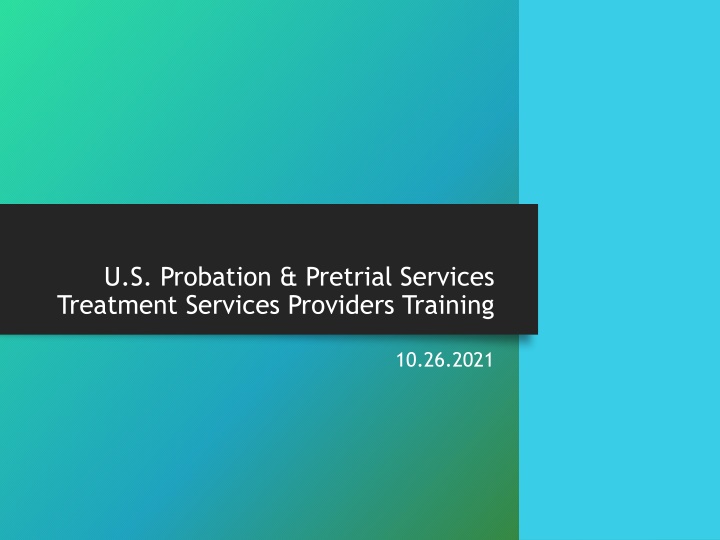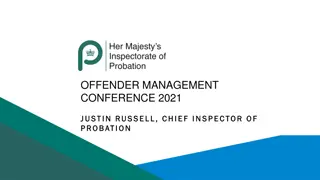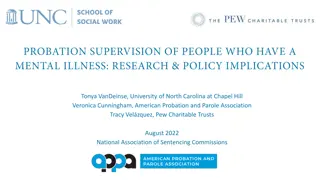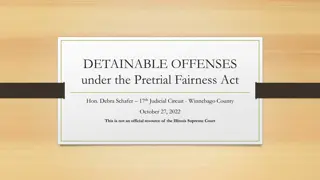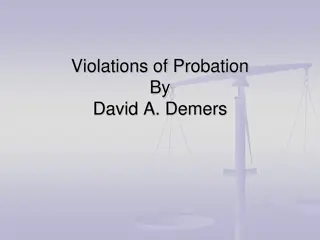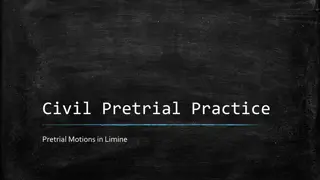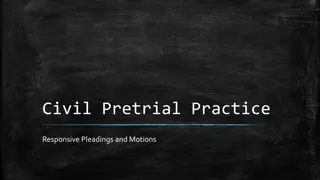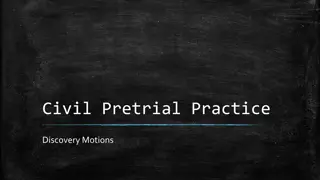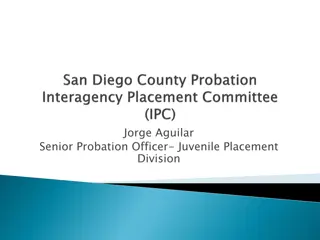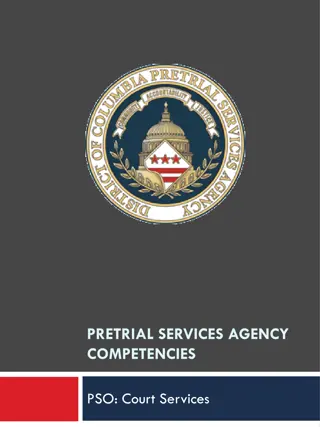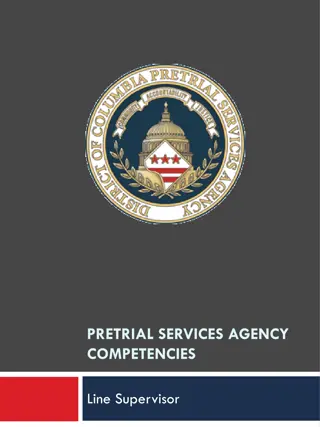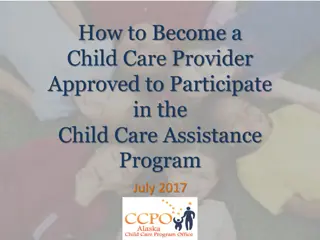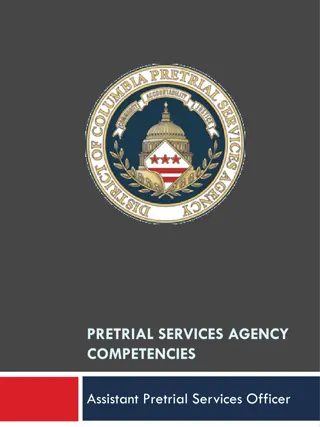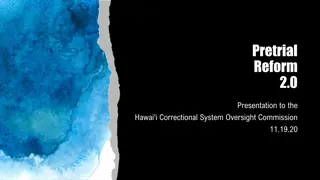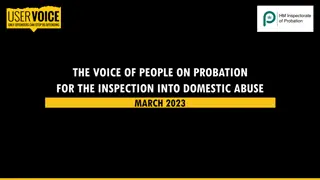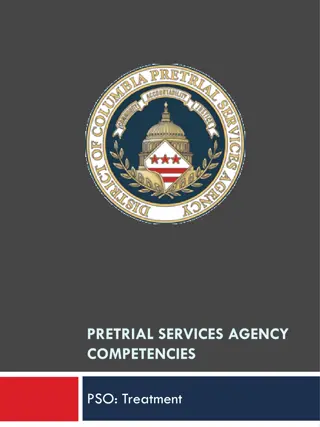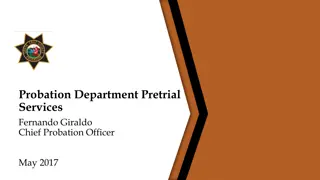U.S. Probation & Pretrial Services Treatment Services Providers Training
This update covers the recent training session by U.S. Probation & Pretrial Services on treatment services providers. The session highlighted findings, recommendations, and next steps for effective monitoring and documentation. Key personnel, including Chief Officer Jeffrey Thomason and other specialists, discussed the importance of communication between officers and vendors, proper documentation of treatment plans, and timely completion of discharge summaries. The update emphasizes the required protocols for cases involving counseling and treatment plans, along with suggestions for improving coordination between counselors and officers.
Download Presentation

Please find below an Image/Link to download the presentation.
The content on the website is provided AS IS for your information and personal use only. It may not be sold, licensed, or shared on other websites without obtaining consent from the author.If you encounter any issues during the download, it is possible that the publisher has removed the file from their server.
You are allowed to download the files provided on this website for personal or commercial use, subject to the condition that they are used lawfully. All files are the property of their respective owners.
The content on the website is provided AS IS for your information and personal use only. It may not be sold, licensed, or shared on other websites without obtaining consent from the author.
E N D
Presentation Transcript
U.S. Probation & Pretrial Services Treatment Services Providers Training 10.26.2021
Welcome/Introductions Jeffrey Thomason- Chief US Probation & Pretrial Services Officer Cindy Martinez- SD Drug Lab Supervisor Roger Robinson- Program Development Specialist, AO Richard Hwang- Supervisor and Treatment Services Coordinator Christina Le- Special Offender Specialist Objectives: Discuss AO Review findings Highlight common monitoring recommendations Provide reminders about proper documentation Discuss next steps/telemedicine
Chief US Probation & Pretrial Services Officer Jeffrey Thomason
SD Pretrial Drug Lab Supervisor Cindy Martinez
Program Development Specialist/EBP Coordinator Roger Robinson
AO Review Findings Officers and Vendors need to communicate MONTHLY for cases with counseling (substance use and MH) Discuss progression/regression in treatment and document this interaction in progress notes and/or MTR s Files did not contain comprehensive Treatment Plans and in many instances, quarterly updates were not being done (for cases with counseling) Discharge summaries were not completed in a timely manner These items are not required for cases referred for drug testing only Suggestion: counselors and Officers can establish a set appointment every month to discuss cases
AO Review Findings Treatment Plans Required for cases with counseling Should be completed at the commencement of treatment within 30 days and updated at least quarterly with defendants/offenders (D/O s) Please remember to email these, along with the Monthly Treatment Reports to Carina Forsythe at: carina_forsythe@cacp.uscourts.gov who will then forward them to assigned PO
AO Review Findings Ensure that treatment plans are present in files and include: (a) short and long term goals for the D/O s; (b) measurable objectives; (c)type and frequency of services to be received; (d) specific criteria for treatment completion and the anticipated time-frame; (e) documentation of treatment plan review (including D/O s input; (f) and, continued need for treatment, if necessary The plan should include information on family and significant others involvement (i.e., community support programs, etc.)
AO Review Findings Discharge Summary- Outpatient Ensure USPO/USPSO within 15 calendar days after treatment is terminated. The summary shall outline the reason for concluding contract services, (i.e., the D/O responded to treatment and treatment is no longer needed, or the D/O failed to respond to treatment) that a typed discharge summary is submitted to the Additionally, the discharge summary shall include recommendations for community-based aftercare that the D/O can readily access In all cases, the discharge status (i.e., successful discharge, unsuccessful discharge, interruption of treatment, etc.) shall be clearly stated
AO Review Findings Discharge Summary- Residential Successful Discharges Summary should describe the D/O s adjustment and performance while in treatment and the circumstances surrounding D/O s termination. A typed summary to the USPO/USPSO within 10 calendar days of the D/O s discharge that includes recommendations for aftercare treatment Unsuccessful Discharges Discharges due to D/O s misbehavior are to be approved by the officer, unless there is a positive lab drug test or an immediate discharge is necessary due to safety issues of other residents. In emergency cases, where pre-approval is not possible, the officer is to be notified within 12 hours of the discharge. A discharge summary must be submitted to the USPO/USPSO within 5 days.
Monitoring Programs will be reviewed at least two times the first and second years of the BPA If unsatisfactory rating, vendor will have a follow- up review Deficiencies can result in a Cure Notice that requires a formal response Vendor will be held to the standards in the proposals submitted Review SOW s, including Local Needs with all staff (found in Section C of the RFP)
Required File Documents Program Plan (initial, amended, terminations) Authorization to Rel. Confidential Information Monthly Treatment Reports Treatment Plans-initial and quarterly updates Chain of Custody forms Daily Treatment Log (outpatient) Chronological notes that include monthly Officer contact and counseling notes Reports and Evaluations (if applicable) Discharge Summaries (if applicable)
Referral Process USPO/USPSO calls or emails to schedule initial intake appointment for D/O USPO/USPSO forwards: Program Plan Aftercare Case Summary/Bail Report Vendor shall: Execute Release of Information form if Officer is unable The vendor shall obtain the D/O s signature before releasing any information regarding the D/O or their treatment in progress to the Officer Please make sure to completely fill out all the blank items, including name and address of the program Form can be found on our internet site
Referrals for MH Treatment Assessments will be requested and must be completed within 15 days Your recommendations for services will be sent to and discussed with the Officers who will amend the program plans accordingly One long-term goal is to get D/O referred to county, VA, Medi-Cal or other services for long- term assistance beyond supervision
Program Plans Review program plans to ensure all necessary codes are included Do not provide any services not listed on the program plan We will not pay for services and no verbal authorizations will be accepted Maintain copies of ALL program plans in the file (initials, amended, terminations)
Co-Payments Defendant/Offender Reimbursement and Co-Payment (SOW) The vendor shall: Collect any co-payment authorized on the Program Plan (Probation Form 45) and deduct any collected co-payment from the next invoice to be submitted to the judiciary; Provide bills and receipts for co-payments to defendants/offenders. The vendor shall keep an individualized record of co-payment collection, make it available for the USPO/USPSO review, and have systems in place to both follow-up on collection of outstanding amounts and to resolve any discrepancies in the amount owed; Document within the Monthly Treatment Report and the Sign-In/Sign-Out Daily Log any co-payment received or whether the expected co-payment was not provided, as well as the amount of any outstanding balance; Inform the USPO/USPSO within 10 calendar days of a defendant s/offender s failure to make a total of three consecutive scheduled co-payments; Reimburse the Judiciary as directed in Section G. Note: The vendor may charge an Administrative Fee (1501) which is a reasonable monthly fee. To administer the collection of fees from defendants/offenders, not exceeding 5% of the monthly funds collected. The vendor shall accept credit or debit card payments for co-payments.
Monthly Treatment Report Instructions : Fill out completely Including test results when applicable Also indicate co-pays collected NO canned language- must be individualized to each client Include Co-payment documentation (paid/owed) Send to Carina Forsythe and also send to Fiscal along with invoice by the 10thof every month
Residential For Substance Use: Submit a MTR monthly. Vendor will include a second page that summarizes the frequencies of all treatment provided in the month including groups, individual sessions, 12-Step meetings, cognitive behavioral groups, and family treatment For Co-Occurring: The MTR is to include information about substance use and mental health issues. A second page is required that summarizes the frequencies of all treatment provided in the month including groups, individual sessions, 12-Step meetings, cognitive behavioral groups, family treatment plus meetings with the psychiatrist, a DSM diagnosis, and a list of all psycho-tropic medications.
Daily Treatment Log (DTL) D/O enters service and signs in and out for each service Each service must be listed on a separate line (i.e. counseling and testing) Vendor also signs each entry TELEMEDICINE: Each session must indicate if it was done via teleconference, video conference or internet Include DTL with invoice submission monthly Include Co-Pay Collected
Telemedicine The AO has approved the use of telemedicine during the pandemic AND beyond Telemedicine is to be used for the benefit of the Judiciary and the D/O, and not solely the convenience of the vendor. Vendor should have D/O sign documentation agreeing to telemedicine Officer and vendor should discuss who would benefit from in-person treatment, and if the D/O approves, there should be an understanding that they need to follow through with the same form of treatment (to help with accountability/miscommunication/no-shows)
Staff changes The vendor shall notify the Treatment Services Coordinator in writing of any staff changes and provide documentation of any required licensing, certification, experience and education requirements, or changes thereof. The vendor shall submit an Offeror s Staff Qualifications form (Section L - Attachment C) for each new staff member added under the agreement. Please indicate the new duties and if the staff will be the contact person for referrals. Vendor shall ensure that new staff is trained in federal procedures as outlined in the SOW.
Code-a-Phone/Testing Issues Change message daily, even if there is no testing the following day Do not give more than 12 hours notice (can begin new messages at 5:00pm) Must save recorded messages for 72 hours Message should be clear Do not advise the D/O of the number of tests for the month
Testing Reminders Ensure you enter the correct PACTS number on each chain of custody form Enter your program name and date of collection is on each chain of custody form Ensure all required signatures are on the chain of custody form prior to packaging sample for mail Ensure you apply the seal correctly in order to avoid compromising the integrity of the sample
More Testing Reminders Ensure that enough pressure is applied to the first ply (chain of custody form) so that the information transfers to the second ply (chain of custody form). Make sure you send the 2ndPly only. Ensure the Laboratory Chain of Custody forms are complete, including the "Medications section. The offender/defendant must write either: 1) the medications they are taking, or 2)"none" if they are not taking medications.
Collectors shall: Use a clinical refractometer on all specimens Ensure specific gravity (s.g.) is 1.003 or higher. DO NOT send an invalid specimen If s.g. is low, allow 2 hours to collect another sample. Ensure sample is no less than 30 milliliters Permit no more than 2 hours to provide a valid sample if stall occurs. Collect urine between the hours of 5:00 am- 9:00 am only.
UA Test Results Positive test results should be discussed with the D/O s and with the assigned Officer Your intervention and recommendations are very important.
Treatment Collaboration Common thread of this presentation was: How to improve compliance with the SOW The importance of the collaboration between the officers, clinicians, collectors, and defendants/offenders Together we can make a significant change in people s lives
Probation & Pretrial Services Website http://www.cacp.uscourts.gov
Contact Info RICHARD HWANG SUPERVISOR AND TREATMENT SERVICES COORDINATOR Richard_Hwang@cacp.uscourts.gov
